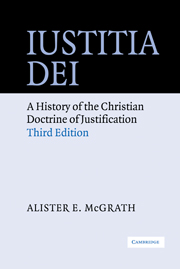Book contents
- Frontmatter
- Contents
- Preface
- List of abbreviations
- 1 Justification: the emergence of a concept
- 2 The Middle Ages: the consolidation of the doctrine
- 3 Protestantism: the Reformation debates on justification
- 4 Catholicism: the Council of Trent on justification
- 5 The modern period
- Glossary of medieval soteriological terms
- Bibliography
- Index
5 - The modern period
Published online by Cambridge University Press: 05 June 2012
- Frontmatter
- Contents
- Preface
- List of abbreviations
- 1 Justification: the emergence of a concept
- 2 The Middle Ages: the consolidation of the doctrine
- 3 Protestantism: the Reformation debates on justification
- 4 Catholicism: the Council of Trent on justification
- 5 The modern period
- Glossary of medieval soteriological terms
- Bibliography
- Index
Summary
Practically every period in human history since the Italian Renaissance may lay claim to having initiated the ‘modern’ period in some way, and to some extent. For instance, it is often argued that Renaissance Italy laid the foundations of modern political theory, marking the transition from the medieval to the ‘modern’ understanding of this particular matter. The question thus arises: when may the transition to the ‘modern’ understanding of the theology of justification be deemed to have taken place?
To answer this question, we need to identify the defining themes of the modern era, an enterprise which is not without its difficulties. Nevertheless, there can be little doubt that one of the most distinctive themes of the modern era is its shift from a fundamentally theocentric to an anthropocentric frame of reference, defined by a new emphasis upon human autonomy, in relation to both revelation and salvation. As Jeffrey Stout notes, ‘modern thought was born in a crisis of authority, took shape in flight from authority, and aspired from the start to autonomy from all traditional influence whatsoever’. This desire for intellectual and political emancipation was often linked with the mythical figure of Prometheus, who came to be seen as a symbol of liberation in European literature. Prometheus was now unbound, and humanity poised to enter a new era of autonomy and progress – independent of God.
- Type
- Chapter
- Information
- Iustitia DeiA History of the Christian Doctrine of Justification, pp. 358 - 421Publisher: Cambridge University PressPrint publication year: 2005



